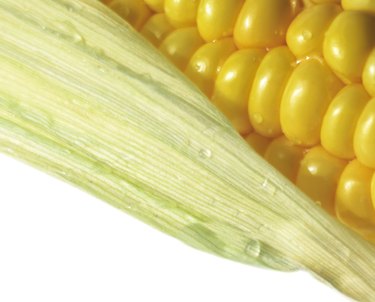
Corn chips are a snack food made from whole corn, corn oil and salt. Because corn chips are made out of the starchy vegetable corn, they are rich in carbohydrate. Carbohydrate is a type of nutrient that, unlike protein and fat, turns into sugar. Carbohydrate-containing foods – including corn chips – break down into glucose sugar molecules during your body's digestion process.
Corn and Carbohydrates
Video of the Day
Carbohydrates include sugar, starch and fiber. Corn is classified as a starchy vegetable, as it is high in starch. In fact, the majority of the carbohydrate content in corn is starch. For example, 1 cup of yellow corn contains about 11 grams of starch, 7 grams of sugar and 3.5 grams of fiber. During digestion, starch and sugar get turned into individual molecules of glucose, the simplest form of sugar. Fiber, however, does not turn into the sugar glucose. Instead, fiber passes through your body undigested.
Video of the Day
Conversion to Sugar
A 1-ounce serving of corn chips contains approximately 15 grams of total carbohydrate. All of the carbohydrate in corn chips is from the corn – neither oil nor salt contains any carbohydrate. After you consume corn chips, the contents travel to your stomach in order to be digested. During digestion, the sugars – including sucrose, fructose and maltose --and starch in the corn chips are broken down into individual molecules of the sugar glucose. The glucose molecules move into your small intestine, then go through the lining of your small intestine in order to get absorbed into your bloodstream. This causes your blood sugar levels to rise.
Sugar and Energy
The process of carbohydrate-containing foods converting into sugar molecules is essential. This is because glucose is your body's primary source of energy. When your blood glucose levels are high, your pancreas is signaled to secrete the hormone insulin. Insulin helps transfer glucose molecules out of your bloodstream and into various cells throughout your body. Your cells use the glucose as energy, so that they can perform their necessary functions. Processed foods such as corn chips do not provide a healthy source of carbohydrate. Healthier choices include fruit, vegetables, whole grains and beans.
Considerations
Fat, along with protein, does not turn into sugar in your body. However, it is important to note that all fat – even heart-healthy unsaturated fat – is energy-dense, meaning it contains a high concentration of calories. A 1-ounce serving of corn chips contains about 160 calories. Corn chips contain corn oil, a type of polyunsaturated fat that may help lower your cholesterol. But keep in mind that corn chips also contain a substantial amount of salt – about 170 milligrams in 1 ounce.
- Fritos: Products -- Fritos Corn Chips
- American Diabetes Association: Food and Fitness – Whole Grain Foods
- American Diabetes Association: Food and Fitness – Carbohydrates
- American Diabetes Association: Food and Fitness – Glycemic Index and Diabetes
- MayoClinic.com: Nutrition and Healthy Eating – Glycemic Index Diet: Losing Weight with Blood Sugar Control, Nov. 24, 2009
- U.S. Department of Health and Human Services: National Digestive Diseases Information Clearinghouse – Your Digestive System and How it Works
- United States Department of Agriculture Nutrient Database
- American Diabetes Association: Food and Fitness – Fat and Diabetes